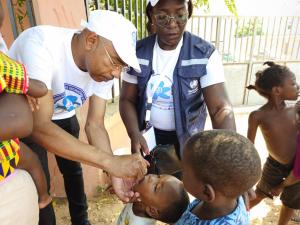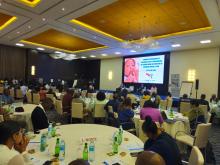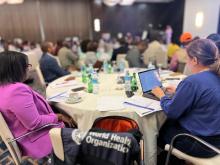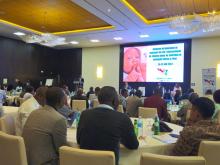Angola holds a comprehensive review and methodological meeting to speed up vaccination.
To ensure that all children are vaccinated and protected from vaccine-preventable diseases, the Ministry of Health, with the support of the WHO, is holding a methodological meeting in Luanda on 20, 21 and 22 August with the participation of partners and health technicians from all the country’s provinces.
According to the Acting WHO Representative in Angola, Dr Zabulon Yoti, the methodological meeting on the Expanded Programme on Vaccination (EPV) is testimony to the collective determination to protect all children in Angola against vaccine-preventable diseases.
“Vaccination remains one of the crucial measures to protect and save lives. Therefore, we must always come together, work together, share experiences, learn from our past, plan our future and make a country free of vaccine-preventable diseases a reality.”
Andrew Trevett, Deputy Representative of UNICEF in Angola, considers the immunisation programme (EPI) to be fundamental for any health system still facing the double burden of communicable and non-communicable diseases.
“As well as protecting against preventable diseases, the EPI also strengthens community health, reduces child mortality and improves community satisfaction, which is why it is necessary to strengthen the effectiveness of the implementation of strategies and the capacity to meet the needs of the most vulnerable communities, home to children who have never been vaccinated.”
In recent years, the Angolan government has made significant investments in health by building and remodelling structures, expanding the national network of health services, gradually acquiring equipment for the cold chain, increasing the workforce and training new professionals in the area of vaccination to improve the supply of vaccines and the population’s vaccination coverage levels.
Despite the efforts and achievements, Angola continues to face several challenges in guaranteeing the immunisation of the population. Therefore, according to WHO data, it is among the three countries in the African region with the highest number of zero-dose children (children without any vaccine dose), with an estimated half a million children not vaccinated with the Penta 1 and Penta 3 vaccines. To recover these children, the WHO supports the Angolan government in implementing the middle-income countries zero doses project (MICS) to reinforce vaccination in 22 municipalities in the five provinces with the highest number of unvaccinated children.
On the other hand, Angola needs to reinforce the immunisation of children against polio due to an ongoing outbreak caused by the importation of the virus from neighbouring countries. To date, 16 virus cases have been confirmed in six provinces: Luanda, Huambo, Lunda Norte, Lunda Sul, Moxico and Benguela. In response, the health authorities conducted two vaccination campaigns in May and June, with around 78 per cent and 84 per cent of municipalities achieving high-quality vaccination coverage in the first and second rounds, respectively. An extended vaccination campaign will be held in September this year as a reinforcement.
For Angola’s Secretary of State for Public Health, Dr Carlos Pinto de Sousa, the government is aware of its challenges, mainly of a structural and financial nature, to increase vaccination coverage and sustainably include all children. However, ‘it fully trusts in everyone’s leadership and commitment to overcome this challenge and sustainably reduce the number of Zero-Dose children’.
“The vaccine is one of the most powerful tools we have at our disposal to protect lives and prevent diseases such as polio, relieving pressure on our health system and allowing valuable resources to be directed towards treating other conditions that vaccines cannot prevent. This event will allow us to conduct an exhaustive assessment of routine vaccination indicators and the challenges and constraints preventing us from achieving high coverage and protecting our population.”
The methodological meeting on vaccination in Angola represents a crucial opportunity to assess the leading performance indicators of routine immunisation, the Zero-Doses MICs Project, report on the National Vaccination Campaign Plan for the Prevention of Cervical Cancer, define the actions for the National Polio Vaccination Campaign, as well as establish essential initiatives for improving vaccination in the country.



